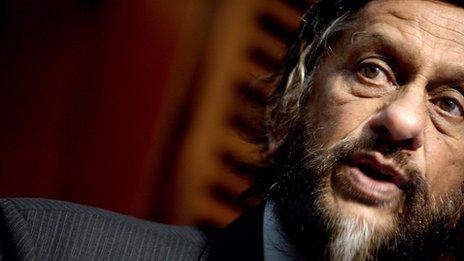Viewpoints: Reactions to the UN climate report
- Published
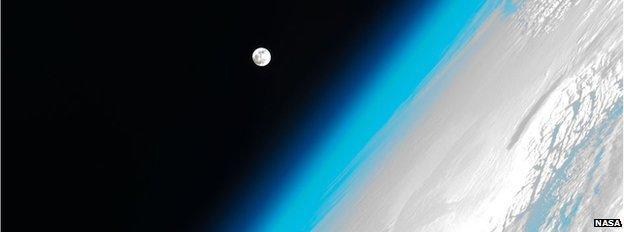
Scientists are concerned it will be difficult to stay below the 2C target
A landmark report says scientists are 95% certain that humans are the "dominant cause" of global warming since the 1950s. The report by the UN's climate panel details the physical evidence behind climate change.
Here are a selection of reactions to the report.
Paul Nurse, president of the Royal Society
It is becoming increasingly clear that we are responsible for warming of the Earth primarily due to the burning of fossil fuels. Predicting the implications of this or how the picture will change in the future are big challenges for scientists and today's report by the IPCC, whilst recognising uncertainties, gives us the best possible insight into what may lay ahead.
Those who predict imminent disaster are probably overstating the case, but equally those who claim that we can carry on regardless are likely to be burying their heads in the sand.
Predicting what will happen to climate is very complicated and there is still a lot that we do not know, but we cannot afford to wait until we can predict the future with absolute certainty before addressing the risks. We invest substantially, both as a country and individually, to insure ourselves against a wide range of risks that are less likely than climate change.
The IPCC report provides a sound evidence base on which policy makers can make their decisions on appropriate action. Ignoring the problem is simply not sensible and most governments, businesses and individuals recognise that. The more convincing the evidence becomes, the more confident I am that rationality and science will win out and we will grasp the opportunities that decarbonising our economy offers.
Dr Emily Shuckburgh, British Antarctic Survey
Our collective actions have generated a climate problem that threatens our future and our children's future. Increasing levels of greenhouse gases are disrupting our climate. And because it is the cumulative amounts of greenhouse gases that determine the severity of the impact, any delay in reducing emissions will lead to greater risks and a need to deploy more difficult and expensive means to adapt to the impacts.
One of the key developments since the last report has been an increased understanding of changes in the polar regions and their global effects. Arctic sea ice has declined significantly and new research is starting to shed light how this affects our weather in the UK.
The Antarctic Peninsula has seen significant warming and the breakup of a number of its ice shelves. The Southern Ocean around Antarctica has warmed throughout its depth. And it has now been possible to estimate the contribution of melting of the polar ice sheets to sea level rise.
Kevin Anderson, professor of energy and climate change at the University of Manchester
What has changed significantly since the last report is that we have pumped an additional 200 billion tonnes of CO2 into the atmosphere. Annual emissions are now 60% higher than at the time of the first report in 1990 and atmospheric CO2 levels are the highest they have been for over two million years.
So what are we doing in the UK to help reverse this reckless growth in emissions? Record levels of investment in North Sea oil, tax breaks for shale gas, investment in oil from tar sands and companies preparing to drill beneath the Arctic.
Against this backdrop, the UK Treasury is pushing for over 30 new gas power stations, whilst the government supports further airport expansion and has dropped its 2030 decarbonisation target - all this alongside beleaguered plans for a few wind farms and weak energy efficiency measures. Governments, businesses and high-emitting individuals around the world now face a stark choice: to reduce emissions in line with the clear message of the IPCC report, or continue with their carbon-profligate behaviour at the expense of both climate-vulnerable communities and future generations.
Tim Gore, Oxfam's international policy adviser on climate change
The latest climate science affirms what small-scale farmers around the world are telling us: seasons are changing, weather is increasingly extreme and unpredictable, making it tougher to feed their families.
This report also tells us it is possible to avoid the very worst impacts of climate change and the goal of ensuring everyone has enough to eat is still attainable.
Governments should learn from the mistakes of the global financial crisis, where warning signs were ignored, and listen to the experts before it is too late.
They must take actions immediately to slash emissions as well as investing in building the resilience of people in poverty so we can move from the current path facing disaster to higher safer ground.
Wendel Trio, director of the Climate Action Network Europe
The debate about the responsibility for climate change is now over. What we need now is for all 28 EU delegates that signed off on this report to take this mandate back to their capitals and urge their governments to take immediate climate action.
Dr Benny Peiser, director of the Global Warming Policy Foundation (GWPF)
Today the IPCC has taken a huge gamble that will soon determine whether it is still fit for purpose. Unless global temperature will begin to rise again in the next few years, the IPCC is very likely going to suffer an existential blow to its credibility.
Nick Sanderson, a spokesman for the UK Youth Climate Coalition
The report showed the last 30 years were the hottest in centuries, but while scientists have worked during that time to explain the problem, world leaders have barely lifted a finger to tackle it.
The UK Youth Climate Coalition is calling for urgent national action on climate change, and for a fair and ambitious global deal in 2015 to go above and beyond the high-risk 2C carbon budget contained in today's report.
We can't afford to lose another lifetime to inaction. Countries around the world have agreed to negotiate a legally binding global deal in 2015 in Paris to tackle climate change, but already some are predicting the move will fail as efforts did in Copenhagen in 2009 to reach agreement.
Ed Davey, climate change secretary
The gases emitted now are accumulating in the atmosphere and so the solutions must be set in motion today. The risks and costs of doing nothing today are so great, only a deeply irresponsible government would be so negligent.
Without urgent action to cut greenhouse gas emissions, this warming will continue, with potentially dangerous impacts upon our societies and economy.
This strengthens the case for international leaders to work for an ambitious, legally binding global agreement in 2015 to cut carbon emissions.
Natalie Bennett, Green Party leader
What needs to begin now is a serious, urgent debate about political and policy action. With the Climate Change Act in place, Britain is in a position to be a global leader, which also gives us the opportunity to benefit from a range of new low-carbon industries.
Dr Bjorn Lomborg, adjunct professor at the Copenhagen Business School
This is a chance to steer the climate conversation in a more realistic and constructive direction. The IPCC's moderate projections clearly contradict alarmist rhetoric such as the recurring claims from activists of temperature rise of more than 5C (9F), and sea level rise of 1-2m (3-6ft), not to mention Al Gore's 6m (20ft).
Since 1980, the average of all climate models have overestimated actual temperature increases by 71 to 159%. This does not mean that there is not some global warming, but it likely means that temperature rises will be lower than originally expected. That fact makes alarmist scenarios ever more implausible.
What we need is investment in research and development to reduce green energy's cost and boost its scale. If we can make solar and other green technologies cheaper than fossil fuels, we will have addressed global warming.
Andy Atkins, executive director at Friends of the Earth
Scientists are now as convinced that humans are causing climate disruption as they are that smoking causes cancer - politicians can't continue to stand idly by while the world goes spinning towards climate catastrophe.
Tough action is urgently needed to end the planet's dangerous fossil fuel fixation and to develop the huge job-creating potential of renewable power - with developed nations like Britain taking the lead.
The Coalition government must seize the initiative, starting with a 2030 decarbonisation target for the power sector.
David Bull, UK executive director at Unicef
How we choose to act now will make a vital difference to the lives of today's children and of future generations. We cannot allow them to face a future ruined by climate change.
The lives of the world's most vulnerable children are already in peril, facing water scarcity, food insecurity and increased risk of disasters.
It's our responsibility to help future generations become resilient to climate change. In the next two years the world will have a second chance to agree a deal that can limit the damage. If we fail, our children will carry the devastating burden of our inaction. We look to the UK to play a leading part in ensuring that the right choices are made
Michel Jarraud, secretary general of the World Meteorological Organisation
We have gone a long way in the last 25 years in our knowledge of the climate system and the human role in climate change.
[The report] should serve for yet another wake-up call that our activities today will have a profound impact on society, not only for us, but for many generations to come. Many of the extremes of the last decade were unprecedented.
The IPCC report demonstrates that we must greatly reduce global emissions in order to avoid the worst effects of climate change.
Professor John Shepherd, ocean & earth science, University of Southampton
As expected, the main message is still the same: the evidence is very clear that the world is warming. Natural changes and fluctuations do occur but they are relatively small. There are still uncertainties but the signal is clear enough to justify action: in fact we need less talk and more action.
Uncertainty is a reason to be cautious, but not a reason to do nothing. On the contrary, uncertainty is a reason for taking action to avoid possible serious risks. The recent slow-down in warming is interesting, but it may still be just a wiggle, maybe caused by a natural cycle in the ocean. If so we should expect more rapid warming in a few years time.
There is no reason whatever to suppose that the slow-down is permanent: these things have happened before (e.g. 1950 to 1970), and no-one ever claimed that climate models could predict all these decadal wiggles.
- Published27 September 2013
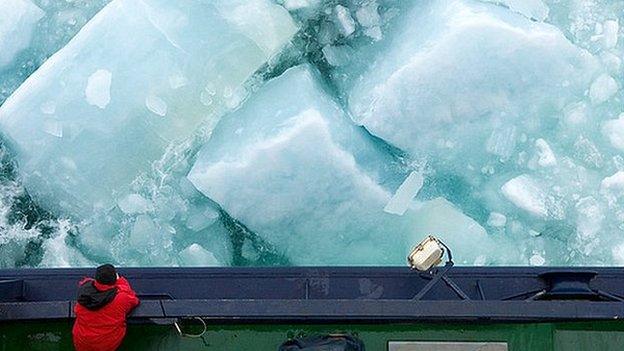
- Published26 September 2013
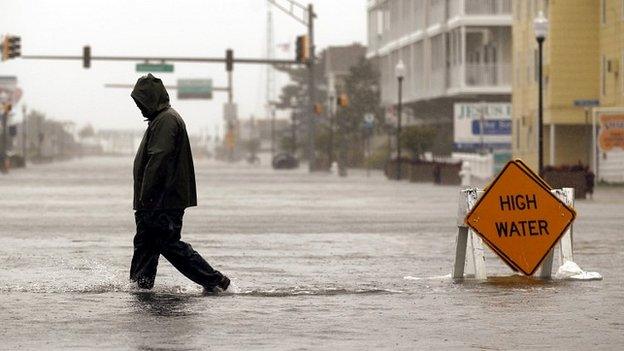
- Published23 September 2013
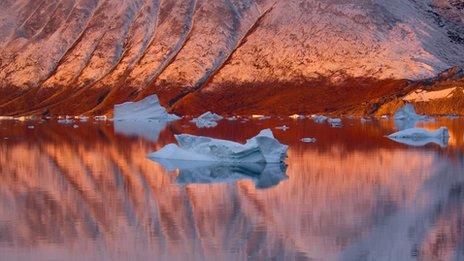
- Published17 October 2013
